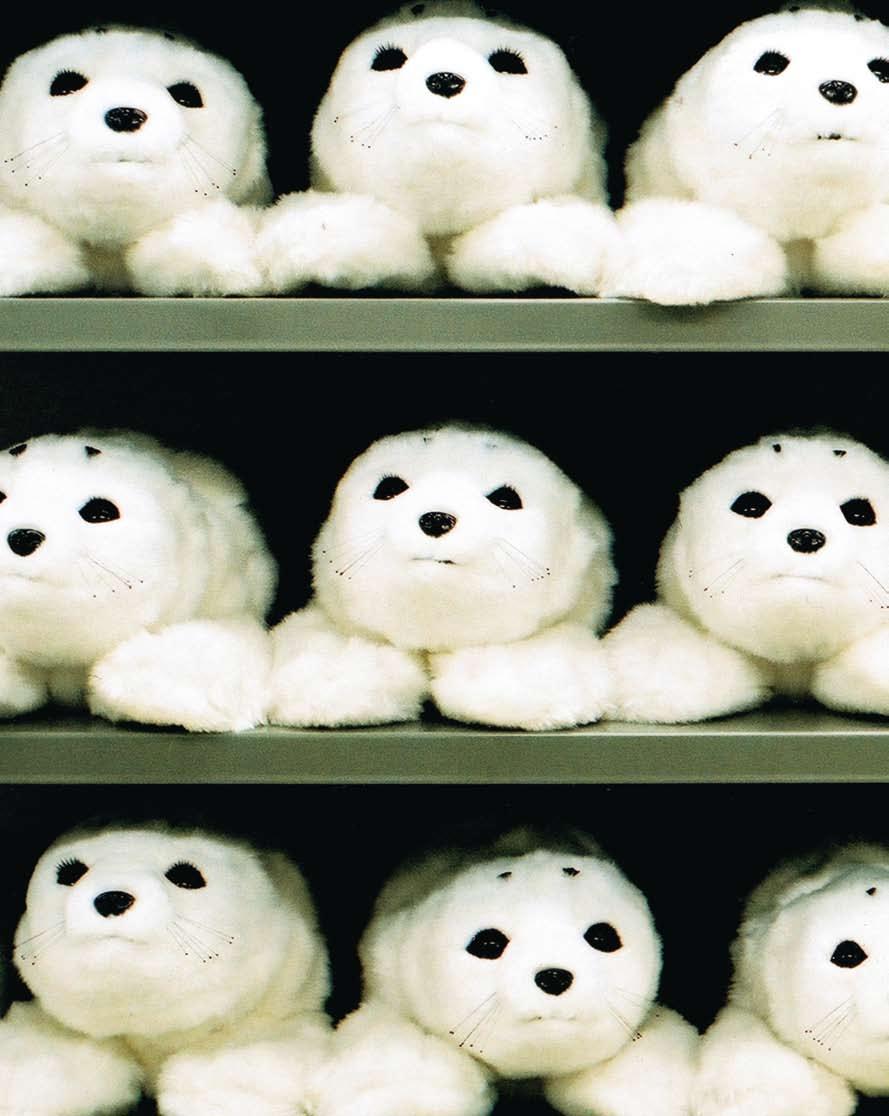What is the difference between humans and machines? What does it mean to have a soul? Can a person love a robot? And, if so, is it the same as loving another person?
A central character is Hiroshi Ishiguro, a Japanese professor who is trying to build a robot that looks just like him. His daughter is recruited as a test subject to examine how she reacts when a robot with her father's physique, face and voice tries to interact with her.
These and other big questions quickly arose when Phie Ambo, who made the 2001 IDFA winner "Family" and in 2006 "Gambler", got the idea to explore the emotional relationships between humans and robots in Mechanical Love. With producer Sigrid Dyekjær of Tju-Bang Film, she threw herself into making an ambitious film for the international market that took her to Switzerland, Italy, Finland, Germany and, most memorably, Japan, as she looked in on people and machines that could make us all smarter about ourselves and our feelings for therapeutic robots.
Characters in the film include Frau Körner, a nursing home resident who receives a Paro, mechanical baby seal. Though rationally she knows the baby seal isn't alive, of course, she quickly develops an emotional relationship with the cuddly, contact-seeking pet and has soon talked herself hoarse about it.
"Mechanical Love" does not lecture on its subject or overload us with facts. In meetings with people and their actions, the film shows us different aspects of the underlying issues. To Ambo, the ability to emotionally approach even quite complex subjects is the amazing thing about working as a documentary filmmaker. Though she spent a long time researching and acquainting herself with the latest developments in robotics, she made sure not to drown the film in scientific issues propped up by endless facts.
"As a filmmaker, you get to ask the same questions science does, but from a more emotional angle," Ambo says. "You can show moments and situations and then let people decide for themselves what they are seeing and what to think about it. Images and moods let you explore emotional aspects of some of the things factual science is struggling to prove with facts."
"Mechanical Love". Photo: Phie Ambo
SOCIAL CONCERNS, NOT NUTS AND BOLTS
Ambo's original concept was to create a filmic progression, tracking people's emotional relationships with other people, from cradle to grave, and how robots may eventually be included in them. The first few sequences she shot was of kids playing with the Amazing Amanda robot doll, but gradually she switched focus from describing a life cycle to highlighting specific stories about human relationships with therapeutic robots.
A central character is Hiroshi Ishiguro, a Japanese professor who is trying to build a robot that looks just like him. His daughter is recruited as a test subject to examine how she reacts when a robot with her father’s physique, face and voice tries to interact with her. Ambo got exclusive access to film these unique family experiments.
"My method is to do meticulous research before I contact people," Ambo says. "This opens doors to fruitful discussions, which at times go beyond the scope of the film. The balancing point is always that, of course, I'm not a robotics researcher. I can find out a lot by researching, but it's not like I really know how you get two lights to blink. So I have to focus on what I know or what is exciting to watch. The exciting thing in this case was to see people and robots together in a social setting, rather than something about turning a bolt."
As Ambo sees it, Western research is focused more on rational function in robots, whereas, in Japanese robotics, she found a tremendous interest in social and human concerns, as emotions are always incorporated into the work.
"There is a reason why the best therapeutic robots come from Japan," Ambo says. "Scientists in Japan are always figuring emotions into the process. What do you expect when you are with another person? What emotions are in play? Working with androids is incredibly exciting, precisely because they are something unto themselves: neither human nor robot. What are they then? They're not alive, but they're not exactly dead either. When you look into their eyes, you feel something, because humans have a need to personify things. That's the subject of a lot of discussion in Japanese research, and getting a glimpse of all the thinking that goes into the research was a tremendous experience."
NATURE AND CULTURE
Ambo operated the camera herself for this film, which made it easier to get close to people and situations. But more than anything, doing her own camerawork is the only way Ambo feels she can continually work towards the film's visual expression.
"For me, the film is in the camera. To find a film's visual expression, I have to sense it and see it and frame it. I can't think it up. I can only find the film when I see it through the viewfinder, and that's why I photograph my own films. I would never have found out how physical it is, if I hadn't shot it myself," Ambo says.
The film's juxtaposition of nature and culture was another thing that popped up in the process. "When it comes to robots, there's a lot of talk about what's 'natural'. I find it interesting to compare mechanics and nature. Which is better made, a blade of grass or an example of a good mechanical structure? What's
natural and what’s not? It's exciting to deal with our perceptions of nature and culture, both content-wise and visually," Ambo says.
"Mechanical Love". Photo: Phie Ambo
ROOM FOR AMBITION
Going to Japan and filming for an extended period is not usually an option for Danish documentary filmmakers. It's expensive to do extended research and shoot abroad, and Ambo was delighted that the process allowed her more than the usual elbowroom, both in the development phase and during the shooting.
"My producer, Sigrid Dyekjær, and I hooked up on "Gambler". That film had a lot of budget problems, which was incredibly exhausting," Ambo says. "From the outset, we decided that "Mechanical Love" would be a bigger-budget film for the international market, and we did a lot of pitching. Right away, there was interest in the film. It meant a lot to me to have a dedicated producer on the project and it saved me worrying about the finances.
"There were a lot of practical matters I didn't have to think about in terms of how far I could go," Ambo says. "The message from Sigrid was always to go ahead and do what was right for the film, and that was a tremendous privilege. As a filmmaker, that allows you to be much more relaxed and take more risks. In many ways, I actually feel the whole process of making a film never really fell into place for me until making my third feature-length documentary."
FIRST INSTALMENT OF A TRILOGY
Ambo is currently developing a new film with Dyekjær, the follow-up to "Mechanical Love" and the second part of a trilogy that looks at what kind of creatures human beings are. For Ambo, it was productive to work from what is really a quite fundamental, banal question with a number of major implications.
"Mechanical Love", in effect, asks a very fundamental question: What are feelings?" Ambo says. "Exploring the possible answers to that, I talked with several neurologists and others who are intrinsically concerned with the nature of thought. I want to explore that in my next film, which has the working title of "Divine Thoughts". The idea is for the third film to focus on physics. What are physics and quantum physics? It's thrilling to examine such big questions. Not least because the times we live in are open to taking up such big discussions.
"In Japan, I talked with a number of scientists who think we are living in a kind of neo-Renaissance distinguished by a readiness to discuss things that we used to think were settled. There is a willingness to turn things upside down, and for a filmmaker it's exciting to sit in on that process and ask questions like: How does our way of thinking affect the things we are actually observing? There are a lot of things we don't even see or pay attention to, because we think in one way rather than another," Ambo says. "I look forward to investigating that in my next film.
"Mechanical Love". Photo: Phie Ambo




